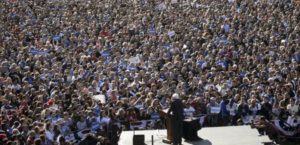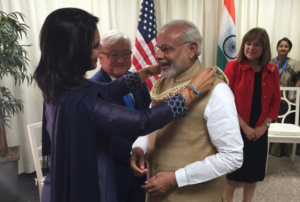
Milan, Italy is known for being one of the fashion capitals in the world and for its stunning architecture and decadent culinary scene. I recently had the opportunity to explore this culture and, while my time in Milan was simply incredible, there was one particular instance that alarmed me: I witnessed a thinly veiled pro-Russian appeasement protest in the Piazza del Duomo—the center of the city.
While the protesters called for an end to the war and an end to NATO, they were specifically in favor of stopping all Italian military aid to Ukraine. This language is reminiscent of Britain and France’s policy of appeasement towards Nazi Germany throughout the 1930s. British Prime Minister Neville Chamberlain built popularity on the idea of “appeasement,” specifically when he signed the 1938 Munich Agreement, which allowed the Nazis to annex Czechoslovakia’s Sudetenland after already occupying the Rhineland and annexing Austria.
The last straw was when Hitler invaded Poland in September 1939. Britain and France declared war on Germany, beginning World War II, the bloodiest war in human history.
In hindsight, it is now very clear that the policy of appeasement only postponed conflict, rather than preventing it. By 1942, at the height of Nazi power, Germany either annexed or occupied the vast majority of continental Europe and their ally, Imperial Japan, conquered a significant portion of Southeast Asia, resulting in approximately 675 million people living under Axis rule.
The policy of appeasement gave the Nazis and the Japanese time to build their military capacities, prepare for a larger conflict and expand their empires while capturing strategic areas and gaining ever-valuable human capital. Germany was able to put down the building blocks for the Holocaust in this time, and had the infrastructure put in place to implement the ‘Final Solution’ against European Jews by 1942.
The policy of appeasement effectively gave Germany the opportunity to plan out its crimes against humanity unchecked. Had Western Europe intervened earlier, Germany would have been less prepared to continue its imperial endeavors whilst fighting against global powers in Britain and France. There would have still been a conflict, but early intervention could have saved millions of lives.
Europe today faces a similar question to the one they faced 90 years ago with the Nazis: to what extent should Europe defend Ukraine against the increasingly tyrannical Russian Federation under Putin? Thus far, Europe has responded by aiding Ukraine against its oppressor, but there is an omnipresent faction that opposes continued military support toward Ukraine. The protest I witnessed in Milan is not an isolated incident. Vice News recently did a piece on the growing presence of similar protests throughout Europe.
This rhetoric is extremely concerning. Ukraine depends on foreign aid for its very survival and the country is using ammunition faster than it can be supplied. If the protesters I witnessed get their way and this aid stops or even decreases, the consequences will be dire not only for Ukraine but possibly for much of Europe.
Europe views Russia as a terrorist state. It has become clear that Putin wishes to re-establish Russian dominance over Eastern Europe in a way that resembles the Soviet Union and there is no telling how far he is willing to go in his imperialist ideology and how many crimes against humanity and war crimes he will commit in the process.
There is documentation of Russian occupiers engaging in the extrajudicial killing of civilians, rape, forceful deportation of children, and the shelling of civilian targets. While this has not yet amounted to genocide, it is entirely possible that an increasingly desperate Putin will resort to an all out genocide of the Ukrainian people and, much like Hitler did nearly a century ago, Putin will continue his rampage far beyond the Ukrainian border and into the European Union.
Those who are in favor of ceasing military aid to Ukraine are not anti-war activists, but rather pro-appeasement activists. I regularly use the words ‘raging pacifist’ to describe myself, but from the basic standpoint of practicality, I am aware that peace negotiations are not currently a possibility when the other side is controlled by a totalitarian dictator insistent on destroying the Ukrainian national identity.
I am far too aware of the consequences of allowing Russia to conquer Ukraine. My own great-grandparents survived a genocidal pogrom in Tsarist Russian-occupied Ukraine before fleeing to the United States. I fear that one day, Europe and the United States will go down the avenue of appeasement. I fear that more innocent Ukrainians will go through what my family went through. I fear for the future of Europe and I fear for democracy.
Supporting Ukraine through this unlawful invasion is a sacrifice. Seeing all of the money that is going to this conflict is difficult to comprehend, especially when the nations offering it have pressing issues of their own. Putin’s War is not just a Ukrainian issue, but rather a Europe-wide issue with global implications.
If Ukraine’s aid needs are not met, it is entirely possible that the same Europeans protesting for the appeasement of Russia will also face the wrath of Putin’s imperial ambitions in a scenario that starkly resembles Nazi Germany’s control over Europe just a few generations earlier.



